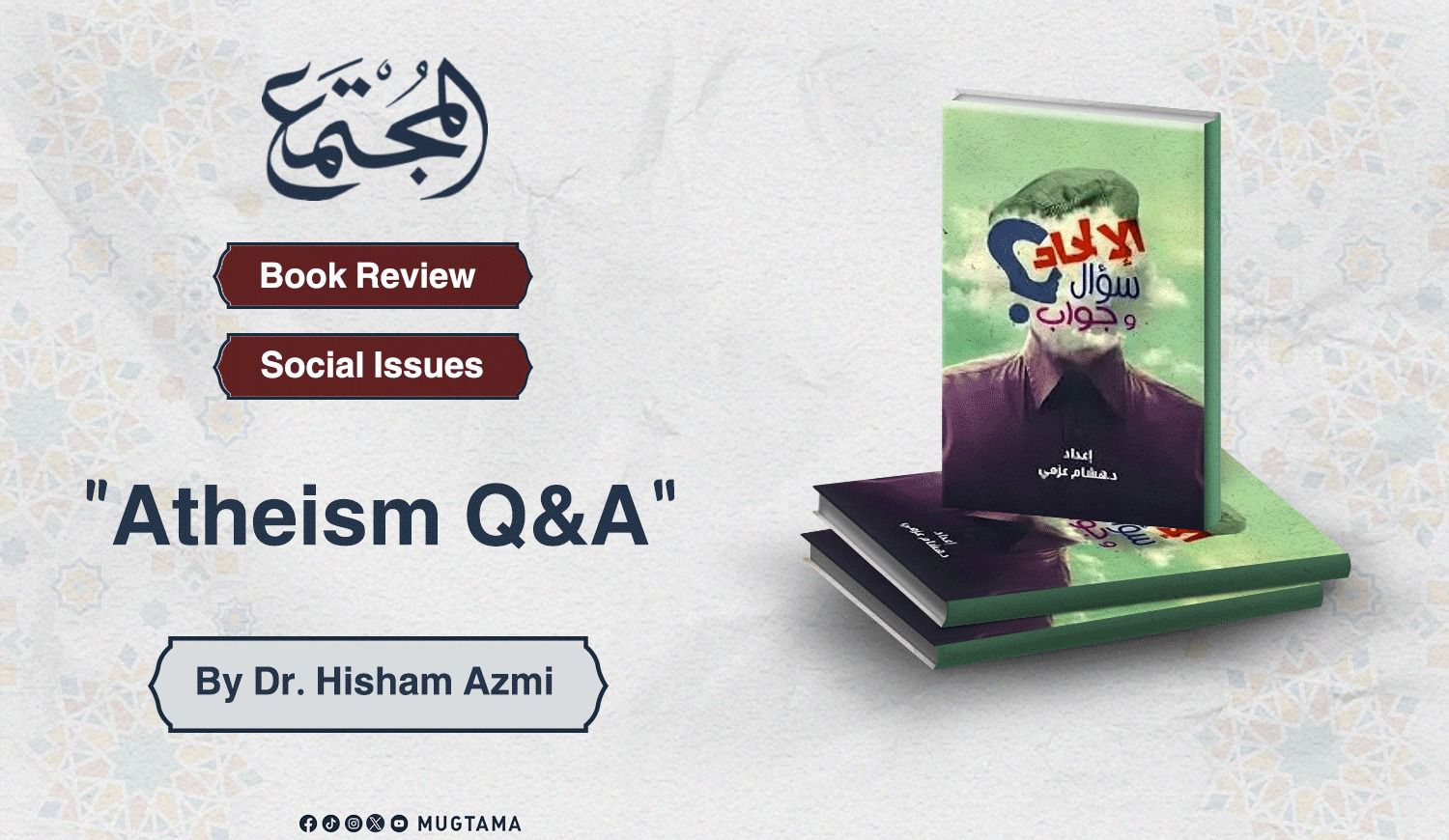Book Review: “Atheism Q&A” By Dr. Hisham `Azmi

Introduction
The Author frames the book as a
response to doubts and challenges faced by today’s youth regarding
faith and atheism. Through a parable about delayed divine justice, he
highlights the Quranic principle that Allah grants respite but never neglects
justice, grounding the discussion in verses that emphasize His ultimate
reckoning. He promises to tackle common misconceptions and questions raised by
atheists, presenting reasoned answers that harmonize sound intellect with
revelation, aiming to show Islam’s ability to provide clear, rational, and
convincing responses to modern ideological challenges.
Allah is free from any need for human worship, as emphasized
in the Quranic verse “I did not create jinn and
humans except to worship Me. I seek no provision from them, nor do I need them
to feed Me” (Adh-Dhariyat 51:56–57). Worship is not for
Allah’s benefit but for humanity’s own fulfillment, as true happiness and
self-realization can only be attained through sincere servitude to Him. The
author explains that unlike humans—whose actions are driven by motives,
benefits, or needs—Allah’s will transcends such categories. The endless chain
of “why” questions stops with His divine will, as He is not questioned about
His actions while His creation is. This chapter sets the tone for the book’s
method of reconciling reason and revelation, showing that the ultimate purpose
of creation is grounded in divine wisdom beyond human comprehension.
Why didn’t Allah consult me before creating me?
Dr. `Azmi explains that consultation implies need or
uncertainty—qualities impossible for Allah, who is perfect in knowledge and
wisdom. Instead, humans are granted choice within life itself: obedience or
disobedience, for which they are held accountable. The author highlights the
logical fallacy in demanding pre-creation consultation, since nonexistence
cannot make decisions, and even immediate post-creation choice would be
baseless without knowledge or experience. Using analogies—like a child absurdly
accusing his parents of injustice for giving him life—he shows that creation
itself is a divine favor, not an act of oppression. Ultimately, the chapter
demonstrates that human free will exists within the framework of divine wisdom,
and rejecting creation would itself be an act of ingratitude and rebellion.
Why should we worship Allah if He did not consult
us before creating us?
The author offers two approaches: to the stubborn skeptic, the
question itself is illogical since consultation before existence is impossible;
to the sincere seeker, he appeals to reason and innate human nature, which
dictate gratitude to the benefactor. Just as a child is naturally obliged to
honor and thank his parents for giving life, care, and support—despite never
being asked beforehand—so too is the human being bound to worship and thank
Allah, the ultimate Creator and Sustainer. The chapter shows that denying
gratitude in such a context contradicts both logic and human experience.
How can we know we are on the truth when there are
thousands of beliefs in the world?
Dr. `Azmi clarifies that the existence of many religions does
not disprove Allah’s existence—just as multiple answers to a question do not
negate the question itself. Rather, it reflects humanity’s innate drive to seek
and worship the divine. He argues that the rational explanation is that one
true religion exists, while the rest are distortions and human fabrications.
The seeker of truth, unlike the dismissive skeptic, investigates sincerely to
identify that religion. The author then outlines two methods to recognize the
true faith: internally, by using reason to reflect on creation, which points
uniquely to the God described by Islam; and externally, by examining the
evidences of prophethood—miracles, divine support, and fulfilled prophecies—all
of which confirm the authenticity of Islam alone.
Why must non-Muslims search for the true religion
while Muslims are not required to do so?
This misconception arises from equating Islam with false
religions. Dr. `Azmi uses the analogy of a key: once someone possesses the
correct key, they do not waste time testing others, but one who lacks it must
search until they find it. Islam, being the religion that perfectly aligns with
human innate, provides certainty and peace that no other faith can offer. He
emphasizes that whatever goodness is found in other religions, Islam surpasses
it, and whatever falsehood exists, Islam is free of it. Unlike other faiths
restricted to specific peoples or cultures, Islam is universal and rooted in
pure monotheism. Therefore, while the seeker outside Islam is obliged to search
for the truth, the Muslim already possesses it and thus has no need to look
elsewhere.
Why does Allah create disbelievers only to punish
them in Hell, and how is that compatible with His mercy?
Disbelief is never punished arbitrarily—disbelievers enter
Hell only after choosing rejection despite being fully equipped with intellect,
ability, and guidance. Their misguidance stems from their own misuse of free
will, while believers elevate in rank by struggling against disbelief, thereby
realizing noble stations like prophethood, martyrdom, and loyalty to Allah. The
author further clarifies that Allah’s mercy operates on two levels: a universal
mercy in worldly blessings, granted to all creation, and a special mercy of the
Hereafter reserved for the believers. Denying punishment for disbelievers would
contradict divine justice, not mercy. Thus, Allah’s attributes of mercy and
justice are not in conflict; rather, they apply differently to different recipients,
reflecting His perfect wisdom and comprehensive governance.
Why is the disbeliever condemned to eternal
Hellfire for disbelief during a short, limited life?
Eternal punishment is just because:
1. The permanence of intention: The disbeliever who
rejects truth knowingly does so with the resolve that, even if he were to live
forever, he would persist in disbelief. His fate, therefore, is judged
according to his intention, in line with the principle “actions are but by
intentions.”
2. The magnitude of the sin: Disbelief is not measured
by the shortness of earthly life but by the gravity of rejecting Allah, the
Creator. Even a single arrogant denial against Him warrants the severest
consequence.
3. The nature of the soul: Punishment is directed at the
corrupted soul, not the isolated act. Just as good deeds reflect a believing
heart that earns Allah’s mercy, persistent disbelief reflects a corrupted
essence that merits eternal fire.
The author cites Quranic evidence, such as “Even if they were to be sent back, they would certainly
revert to what they were forbidden. Indeed they are liars!” (Al-An‘am 6:28), and references scholars
like Ibn Al-Qayyim and Ash-Shanqiti, showing that disbelievers, even if granted
another chance, would continue their rejection.
Why is someone who did not receive the message of
Islam correctly condemned to Hell?
Islamic theology distinguishes between those who truly never
received the message in its authentic form and those who did, but rejected it
due to personal doubts or arrogance.
- If a
person only encountered a distorted version of Islam—for example,
being told it promotes idolatry or that Muslims worship Muhammad (peace be
upon him)—then such a person is excused for ignorance, since they were
never presented with the real call to tawḥid.
- However,
if someone understands the essence of Islam—that it calls to
worshiping Allah alone and that Muhammad (peace be upon him) is His
Messenger—but then rejects it because of objections to secondary issues
(like polygamy or jihad), then that person has knowingly rejected the
truth and cannot be excused.
Allah’s justice ensures no soul will be punished unjustly;
responsibility arises only after the truth has been conveyed in a way that
makes it clear and unmistakable. Thus, the concept of eternal punishment
applies to those who deliberately reject authentic Islam, not those misinformed
about its core message.
How can a disbeliever who served humanity enter
Hell while a sinful Muslim may still enter Paradise?
The ultimate judgment belongs to Allah, who is absolutely
just. Both sinful Muslims and disbelievers are held accountable:
- Muslim
wrongdoers will not escape punishment for their crimes,
but their sins differ fundamentally from disbelief, since they
acknowledged Allah and His oneness.
- Disbelievers,
regardless of their worldly contributions, ultimately refused to serve
Allah. Their good deeds were not performed for Allah’s sake but for
humanity, society, or personal ideals, and thus their reward is with those
for whom they acted—not with Allah.
The author uses vivid analogies:
- A
worker fulfilling tasks for another company cannot demand payment from his
own employer.
- A
student writing brilliant history essays in a physics exam still fails
because he ignored the actual requirements.
- A
doctor decorating a patient’s room with flowers while neglecting
life-saving treatment is guilty, despite his efforts in beautification.
Through these analogies, he shows that the essence of
accountability lies in fulfilling one’s duty toward the Creator, not in
substituting it with other services, however noble they may appear.
Conclusion
Dear Muslim youth, skeptics, and sincere truth-seekers: never
allow doubts and misconceptions to dominate your mind. Instead, seek knowledge
from qualified specialists who are experienced in addressing atheistic
arguments, rather than relying on well-meaning but untrained individuals. While
many objections can be resolved with basic understanding, some require deeper
expertise. The root of every doubt is ignorance, and its remedy is sound
knowledge. The author emphasizes that learning is the believer’s shield against
confusion.
---------------------------------------------------
Read Also:
-
4 Types
of Evidence in the Quran











